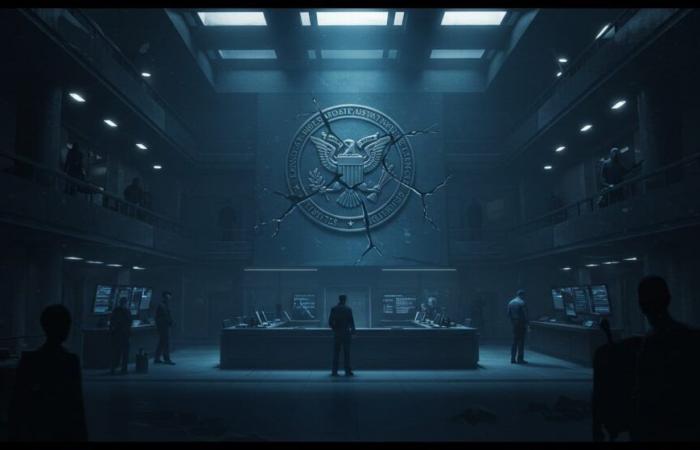The CIA will delete 1,200 positions over several years. Why this decision? What impacts on national security? Discover the underside of this major reform …
Imagine a legendary agency, pillar of world security, forced to reduce its workforce to meet budgetary imperatives. The news has something to surprise: the main external intelligence agency of the United States plans to delete 1,200 positions. This decision, which is part of a context of financial restrictions and political reforms, raises crucial questions. What impact on the ability of the United States to protect its interests? How does such a measure integrate into the broader vision of a government advocating austerity? This article explores the ins and outs of this announcement, its origins, its consequences and what it reveals from the evolution of American priorities.
An unprecedented reform in American intelligence
The deletion of 1,200 positions within the agency is not a trivial decision. It marks a turning point in the management of human and financial resources of an institution accustomed to operating in the shadows. According to official sources, these discounts will spread over several years, without causing dry layoffs. The objective? Realign the workforce on strategic priorities defined by the current administration.
The agency director, John Ratcliffe, stressed the importance of adapting the organization to the new world challenges. In a press release, a spokesperson explained that these changes would better meet expectations in terms of national security. But this announcement comes in a broader context, where budget cuts affect several sectors of the federal administration.
Why delete so many positions?
The decision to reduce the workforce is part of a desire to reduce the size of the federal state. Since the return to power of a republican administration, calls forbudgetary austerity multiplied. Government agencies, including those of intelligence, are asked to rationalize their operations. But where does this pressure come from?
- Financial constraints: The American federal budget faces growing deficits, pushing the government to review its expenses.
- Political priorities: The current administration favors investments in military defense and internal security, to the detriment of other sectors.
- Critics of “Big Government”: A federal anti-state rhetoric, popular in certain political circles, feeds calls to reduce public staff.
This reform is not isolated. Other agencies, such as that specializing in cybersecurity and electronic listening, undergo similar pressure. These changes reflect a vision where efficiency prevails over the expansion of administrative structures.
A context of global reorganization
The reform of the intelligence agency is part of a wider wave of transformations within the United States government. From the start of the year, the agency was the first to offer volunteer cutsanticipating the directives of the executive. This proactivity contrasts with the reluctance of other institutions, which struggle to adapt to new requirements.
“We must make sure that each dollar spent directly strengthens our national security.”
Agency spokesperson
This quote illustrates the state of mind which guides reorganization. But behind the official speeches, concerns emerge. Can the workforce of such a crucial agency be done without compromising its missions?
What impact on the agency’s missions?
With about 21,000 employees (figure estimated from revelations dating from 2013), the agency has a substantial work force. Expressing 1,200 positions represents a reduction of approximately 5 to 6 % of the workforce. If this drop may seem modest, it may affect key sectors, such as data analysis or foreign operations.
The agency’s missions include intelligence collection, the fight against terrorism, and the surveillance of emerging threats, such as cyber attacks. A decrease in human resources could lead to:
- A work overload: The remaining employees must absorb additional responsibilities.
- Increased deadlines: The processing of information could slow down, affecting reactivity in the face of crises.
- A loss of expertise: Voluntary departures risk depriving the specialized talent agency.
These challenges highlight the importance of strategic management of reductions. The absence of dry layoffs is a positive point, but the transition remains delicate.
-NSA and other agencies in turmoil
The external intelligence agency is not the only affected. Another institution, specialized in cyberspionage And the interception of communications, also faces cuts. These reductions are part of a logic of rationalization of expenses, but they arouse debates. Can we really reduce the budgets of intelligence agencies without compromising security?
To better understand the magnitude of the changes, here is a comparative table of potential impacts:
| Agence | Discounts planned | Potential impact |
|---|---|---|
| External intelligence agency | 1,200 positions | Drawing of operations, loss of expertise |
| Cybersecurity agency | Unrecognized | Increased vulnerability to cyber attacks |
This table highlights the risks associated with these reforms. Cybersecurity, in particular, is an area where the United States cannot afford to lower the guard.
A wider austerity project
The deletions of posts are part of a larger budget project, recently unveiled by the administration. This plan ofausterity aims to reduce spending in many sectors, while preserving military and security budgets. Other institutions affected, the drug and food regulation agency had to recall dismissed employees urgently, a sign of tensions caused by these reforms.
This choice of austerity reflects a political vision which favors a minimum intervention of the state. But it also arouses criticism, especially from those who believe that essential public services should not be sacrificed.
Long -term reactions and issues
The news of the cuts has aroused mixed reactions. On the one hand, supporters of austerity greet an approach to make administration more effective. On the other, criticisms are concerned about the consequences on the national security And the ability of the United States to deal with global threats.
“Reducing the workforce of such a crucial agency is playing with fire.”
Security analyst, anonymous
In the long term, these reforms could redefine the role of American intelligence agencies. A key question remains: how to maintain a balance between budgetary efficiency and operational performance?
Towards a new era for intelligence?
The removal of 1,200 positions is only a symptom of a deeper transformation. Intelligence agencies, long perceived as untouchable, must now adapt to a changing political and economic environment. This evolution could open the way to a modernization of practices, but it also includes risks.
In summary, the issues are multiple:
- Preserve operational capacity despite the reductions.
- Invest in technologies to compensate for the drop in staff.
- Maintain the confidence of international allies in American intelligence.
The future will say if these reforms will strengthen or weaken the position of the United States on the world scene. One thing is certain: decisions made today will have repercussions for years.
Conclusion: a risky bet
The abolition of 1,200 positions within the external intelligence agency marks a turning point in the history of this institution. Between budgetary imperatives and strategic priorities, the American administration plays a complex partition. If the objective is to make the agency more agile and efficient, the risks of loss of skills and overload of work are real. In a world where threats evolve quickly, the United States’s ability to maintain their leadership in intelligence will be closely scrutinized. This reform, at the crossroads between austerity and ambition, could redefine the future of national security.






